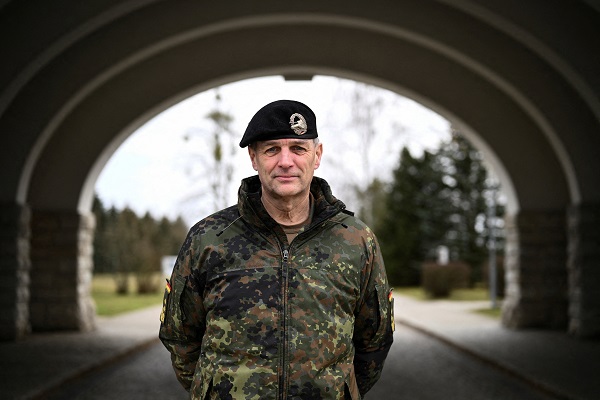 Lieutenant General Andreas Marlow, Commander of the German units multinational corps and basic military organisation of the German army, poses for a picture after a Reuters interview, at the von-Hardenberg barracks in Strausberg, Germany, 22 February 2023;
Credit: Reuters/Annegret Hilse/File Photo
Lieutenant General Andreas Marlow, Commander of the German units multinational corps and basic military organisation of the German army, poses for a picture after a Reuters interview, at the von-Hardenberg barracks in Strausberg, Germany, 22 February 2023;
Credit: Reuters/Annegret Hilse/File Photo
BERLIN (Reuters) - Old Soviet tanks have been borrowed from museums to help train Ukrainian troops on what a commander of the EU training mission for Kyiv says are booby-trap tactics used by Russian soldiers on the battlefield.
Instructors from seventeen nations have trained some 18,000 Ukrainian troops in Germany to operate high-spec tanks or precision air defence systems and passed on their skills to snipers, engineers, paramedics and for drone warfare.
But with the Russian and Ukrainian armies blasting thousands of shells at each other every day in grinding combat that echoes the trench warfare of World War One, Ukraine has also sought training in circumstances more representative of the battlefield reality as well as on some older equipment.
So the German military has dug trench systems according to Russian standards and borrowed museum piece Soviet tanks to enhance the on-the-ground experience at some of its training sites.
"These [museum] systems are in use on the Russian side, and they sometimes plant booby traps in abandoned gear," Lieutenant-General Andreas Marlow, head of the EU's Special Training Command near Berlin, told Reuters. "Providing such vehicles in the training makes it easier to demonstrate where to be cautious to make sure that you don't trigger an explosion if you find them on the battlefield and open the door."
The training command declined to say from where the tanks were borrowed or how many were in use.
The command is part of a European Union military mission set up in 2022 to train Ukrainian troops to combat Russia's invasion.
On Friday 8 November 2024, the mission was extended by another two years as Ukrainian troops face Russian forces advancing at the fastest pace since the early days of the war.
Part of the training in Germany now also involves studying Russian trench systems, which Marlow said were typically built to a fixed scheme.
"It is about the shape of the trenches, where to expect shelters and weapons positions," he said.
Instructors are not only looking into the past for inspiration. Modern simulators have been brought in to train Ukrainian units in combat shooting as well as high-tech dummies that present combat medics with more complex cases.
At the same time, drones are playing a much bigger role in training now, teaching surveillance techniques as well and raising awareness of the constant danger posed by enemy drones hovering in the sky, Marlow said.
Moscow and Kyiv have both sought to buy and develop new drones, deploy them in innovative ways, and find new ways to destroy them.








